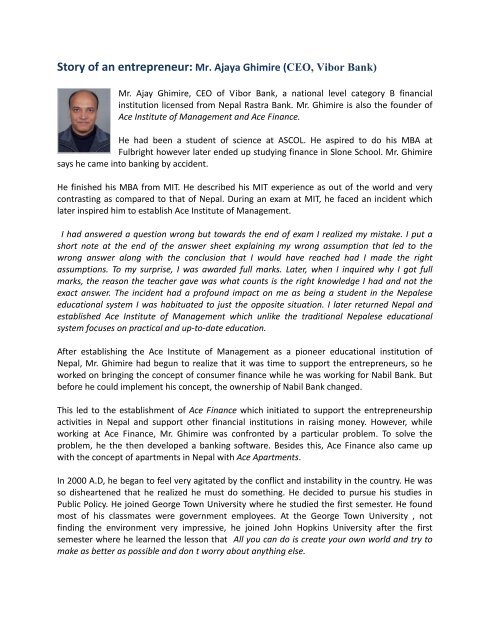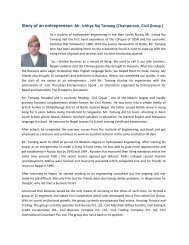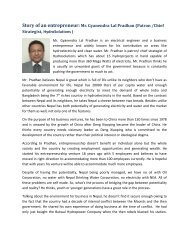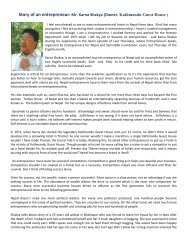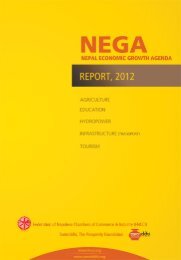Mr. Ajaya Ghimire (CEO, Vibor Bank) - Samriddhi, The Prosperity ...
Mr. Ajaya Ghimire (CEO, Vibor Bank) - Samriddhi, The Prosperity ...
Mr. Ajaya Ghimire (CEO, Vibor Bank) - Samriddhi, The Prosperity ...
Create successful ePaper yourself
Turn your PDF publications into a flip-book with our unique Google optimized e-Paper software.
Story of an entrepreneur: <strong>Mr</strong>. <strong>Ajaya</strong> <strong>Ghimire</strong> (<strong>CEO</strong>, <strong>Vibor</strong> <strong>Bank</strong>)<br />
<strong>Mr</strong>. Ajay <strong>Ghimire</strong>, <strong>CEO</strong> of <strong>Vibor</strong> <strong>Bank</strong>, a national level category B financial<br />
institution licensed from Nepal Rastra <strong>Bank</strong>. <strong>Mr</strong>. <strong>Ghimire</strong> is also the founder of<br />
Ace Institute of Management and Ace Finance.<br />
He had been a student of science at ASCOL. He aspired to do his MBA at<br />
Fulbright however later ended up studying finance in Slone School. <strong>Mr</strong>. <strong>Ghimire</strong><br />
says he came into banking by accident.<br />
He finished his MBA from MIT. He described his MIT experience as out of the world and very<br />
contrasting as compared to that of Nepal. During an exam at MIT, he faced an incident which<br />
later inspired him to establish Ace Institute of Management.<br />
“I had answered a question wrong but towards the end of exam I realized my mistake. I put a<br />
short note at the end of the answer sheet explaining my wrong assumption that led to the<br />
wrong answer along with the conclusion that I would have reached had I made the right<br />
assumptions. To my surprise, I was awarded full marks. Later, when I inquired why I got full<br />
marks, the reason the teacher gave was what counts is the right knowledge I had and not the<br />
exact answer. <strong>The</strong> incident had a profound impact on me as being a student in the Nepalese<br />
educational system I was habituated to just the opposite situation. I later returned Nepal and<br />
established Ace Institute of Management which unlike the traditional Nepalese educational<br />
system focuses on practical and up-to-date education.”<br />
After establishing the Ace Institute of Management as a pioneer educational institution of<br />
Nepal, <strong>Mr</strong>. <strong>Ghimire</strong> had begun to realize that it was time to support the entrepreneurs, so he<br />
worked on bringing the concept of consumer finance while he was working for Nabil <strong>Bank</strong>. But<br />
before he could implement his concept, the ownership of Nabil <strong>Bank</strong> changed.<br />
This led to the establishment of Ace Finance which initiated to support the entrepreneurship<br />
activities in Nepal and support other financial institutions in raising money. However, while<br />
working at Ace Finance, <strong>Mr</strong>. <strong>Ghimire</strong> was confronted by a particular problem. To solve the<br />
problem, he the then developed a banking software. Besides this, Ace Finance also came up<br />
with the concept of apartments in Nepal with Ace Apartments.<br />
In 2000 A.D, he began to feel very agitated by the conflict and instability in the country. He was<br />
so disheartened that he realized he must do something. He decided to pursue his studies in<br />
Public Policy. He joined George Town University where he studied the first semester. He found<br />
most of his classmates were government employees. At the George Town University , not<br />
finding the environment very impressive, he joined John Hopkins University after the first<br />
semester where he learned the lesson that “All you can do is create your own world and try to<br />
make as better as possible and don’t worry about anything else.”
After returning to Nepal, <strong>Mr</strong>. <strong>Ghimire</strong> started <strong>Vibor</strong> Investment in partnership which later broke.<br />
<strong>The</strong>n, he established <strong>Vibor</strong> <strong>Bank</strong> and is currently the Chairperson/<strong>CEO</strong> of the bank. He<br />
describes <strong>Vibor</strong> <strong>Bank</strong> as an institution that envisions proliferation of entrepreneurs in Nepal and<br />
has the mission of making capital accessible to more and more entrepreneurs which might<br />
enhance their productivity. He believes traditional banking system cannot provide enough<br />
support to entrepreneurs and therefore he intends to do it through <strong>Vibor</strong> bank.<br />
<strong>Mr</strong>. <strong>Ghimire</strong> believes lack of capital shouldn't be the constraint to entrepreneurs, what really<br />
matters is the idea and persistence of the person. He concluded his experience sharing by telling<br />
that to support the entrepreneurs of Nepal is the dream of <strong>Vibor</strong> bank.<br />
Questions and Answers<br />
1. Why partnership doesn’t work in Nepal?<br />
- Because of lack of habit of writing down agreements and poor legal system makes it difficult<br />
for partnership to work.<br />
2. Why the venture capitalism hasn't begun in Nepal?<br />
- <strong>The</strong>re isn't enough capital in Nepalese markets for the venture capitalists to work.<br />
- It can be hoped that there will be enough capital in future and venture capitalism will flourish<br />
in Nepal.<br />
3. Will the arrival of international financial institutions pose a serious threat to the local banks in<br />
Nepal?<br />
No, the arrival of International financial institutions in 2011 wouldn’t pose serious threat to the<br />
survival of the local banks. Even though international financial institutions might have immense<br />
capital at their disposal, Nepalese banks have the local knowledge which will act as a<br />
competitive advantage to local banks.<br />
3. What would be the strategies to promote entrepreneurship in Nepal?<br />
- <strong>The</strong>re is the need of strong enforcement of contracts, finding the right people to invest on,<br />
strong rule of law and development of platform where young entrepreneur could come and<br />
discuss.<br />
4. What future do you see with the downturn of the economy?<br />
- Fortunately our linkage with foreign financial arena is not strong enough to have a great<br />
impact on our economy but still there is the need of being cautious.<br />
<strong>Mr</strong>. <strong>Ghimire</strong> further highlighted the mindset of traditional banks that were unwilling to take
isks by investing in entrepreneurs rather than invest in secure places and make profits. He also<br />
said it was important to have network in politics in order to do business and the importance of<br />
having someone working in the organization that is good at dealing with bureaucracy.<br />
According to <strong>Mr</strong>. <strong>Ghimire</strong> the basic qualities that an entrepreneur should possess are:<br />
persistence, ability to sell an idea, ability to connect with people and convince them of the idea,<br />
passion about the cause, deep understanding of the business environment and politics.<br />
By Surath Giri<br />
Program Assistant<br />
<strong>Samriddhi</strong>, <strong>The</strong> <strong>Prosperity</strong> Foundation<br />
For more stories visit: http://www.samriddhi.org/page.php?id=12


